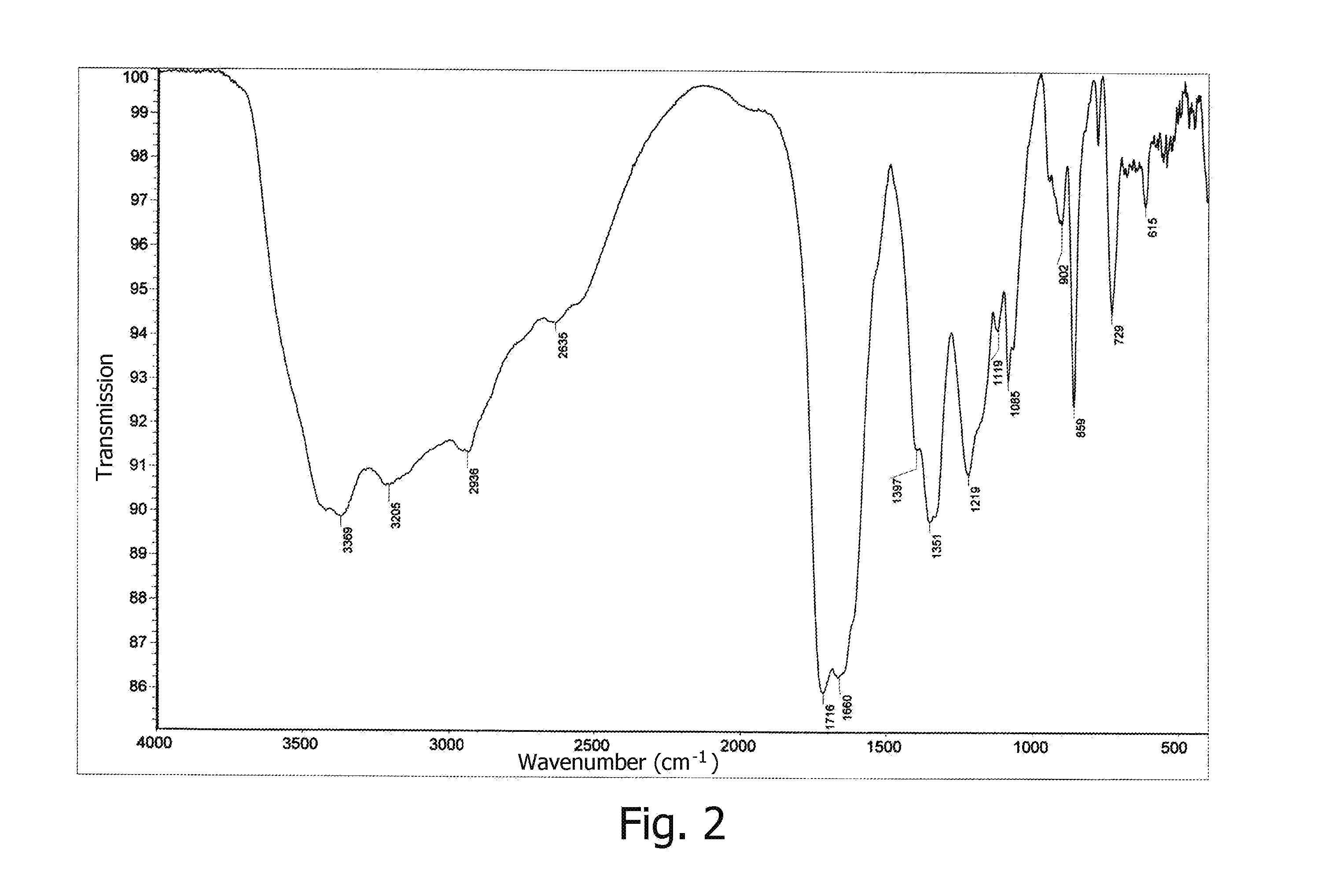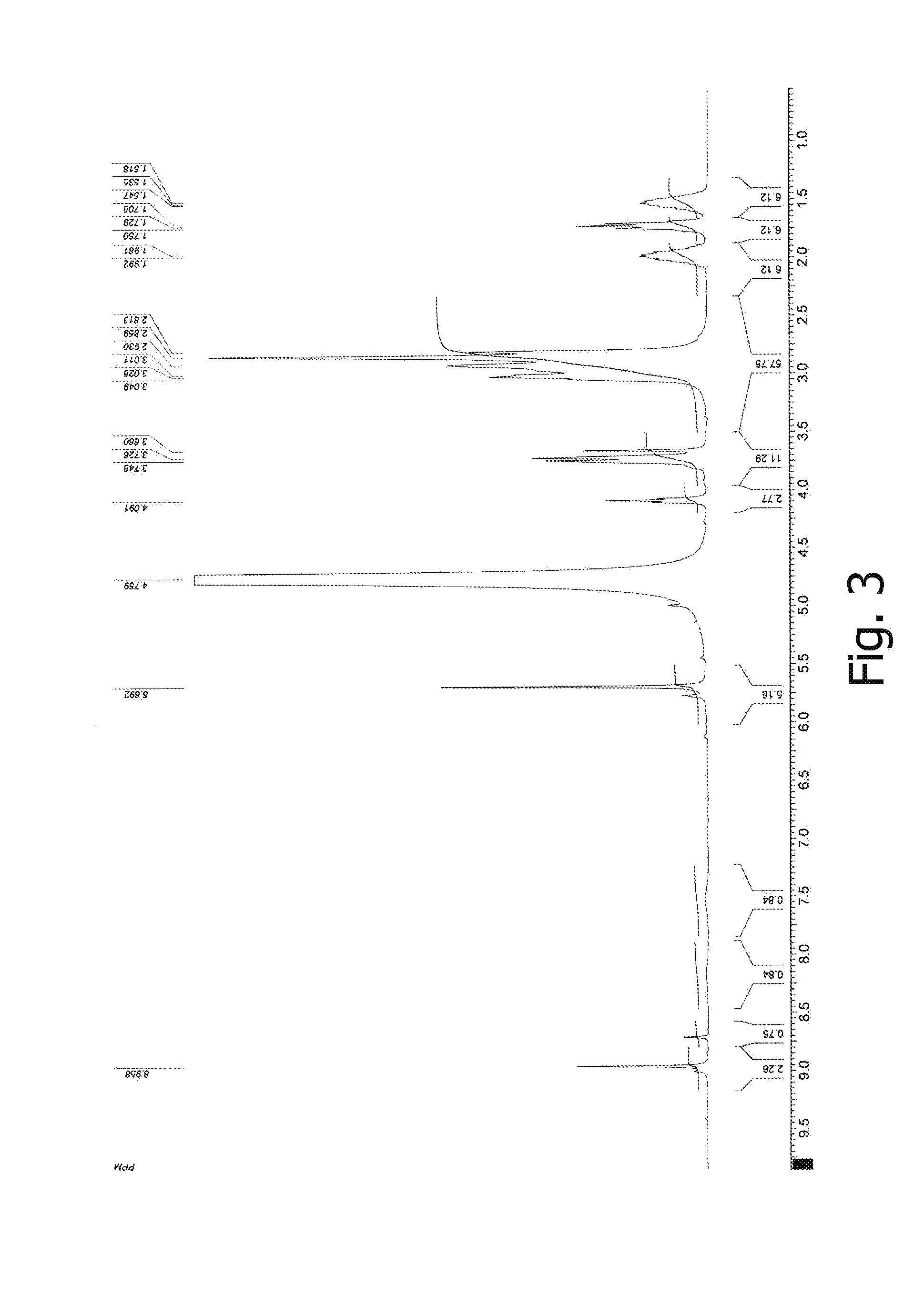Complex compounds of germanium, methods for producing same, and drugs
a germanium complex and compound technology, applied in the field of medicine and pharmacology, can solve the problems of reducing the bioavailability of acyclovir, the inability to manufacture such compounds, and the inability to bind to acyclovir in hydrophobic systems, etc., and achieves the effect of stable solid state and easy production
- Summary
- Abstract
- Description
- Claims
- Application Information
AI Technical Summary
Benefits of technology
Problems solved by technology
Method used
Image
Examples
example 1
[0069]To a round-bottomed flask equipped with a stirrer and a thermometer, charged are 3.12 g (0.03 mol) α-germanium dioxide and 12.6 g (0.06 mol) citric acid monohydrate, and 200 mL distilled water. The slurry is stirred under heating (at 85-95° C.) for 8-9 hours until a clear solution is formed. Then, added are 2.61 g (0.015 mol) arginine and 3.38 g (0.015 mol) acyclovir, and stirring under heating (at 85-95° C.) is carried out for 2 hours. Following this, the solution is cooled and filtered, and water is removed on a rotary evaporator. The product is obtained as 19.5 g (95%) of a white amorphous powder.
[0070]NMR and IR spectra were measured and interpreted, and elemental analysis data were obtained for the germanium complex compound prepared according to Example 1. FIG. 1 displays a 1H NMR spectrum in D2O for the germanium complex compound with arginine, citric acid, and acyclovir. FIG. 2 displays an IR spectrum of the germanium complex compound with arginine, citric acid, and ac...
example 2
[0071]To a round-bottomed flask equipped with a stirrer and a thermometer, charged are 3.12 g (0.03 mol) α-germanium dioxide, 12.6 g (0.06 mol) citric acid monohydrate, 4.5 g (0.06 mol) glycine, 9.73 g (0.03 mol) valacyclovir, and 250 mL distilled water. The slurry is stirred under heating (at 85-95° C.) for 10-12 hours. The resulting clear solution is cooled and filtered, and water is removed on a rotary evaporator. The product is obtained as 27.1 g (94%) of a white amorphous powder. Relevant elemental analysis data are displayed in Table 1. The compound of this example is hereinafter denoted as WDS-2.
example 3
[0072]To a round-bottomed flask equipped with a stirrer and a thermometer, charged are 3.12 g (0.03 mol) α-germanium dioxide, 12.6 g (0.06 mol) citric acid monohydrate. 7.6 g (0.03 mol) pencyclovir, and 250 mL distilled water. The slurry is stirred under heating (at 85-95° C.) for 7-9 hours until a clear solution is formed. Then added are 5.22 g (0.03 mol) arginine, and stirring under heating (at 85-95° C.) is carried out for 2 hours. Following this, the solution is cooled and filtered, and water is removed on a rotary evaporator. The product is obtained as 26 g (95%) of a white amorphous powder. Relevant elemental analysis data are displayed in Table 1. The compound of this example is hereinafter denoted as WDS-3.
PUM
| Property | Measurement | Unit |
|---|---|---|
| Temperature | aaaaa | aaaaa |
| Temperature | aaaaa | aaaaa |
| Temperature | aaaaa | aaaaa |
Abstract
Description
Claims
Application Information
 Login to View More
Login to View More - R&D
- Intellectual Property
- Life Sciences
- Materials
- Tech Scout
- Unparalleled Data Quality
- Higher Quality Content
- 60% Fewer Hallucinations
Browse by: Latest US Patents, China's latest patents, Technical Efficacy Thesaurus, Application Domain, Technology Topic, Popular Technical Reports.
© 2025 PatSnap. All rights reserved.Legal|Privacy policy|Modern Slavery Act Transparency Statement|Sitemap|About US| Contact US: help@patsnap.com



